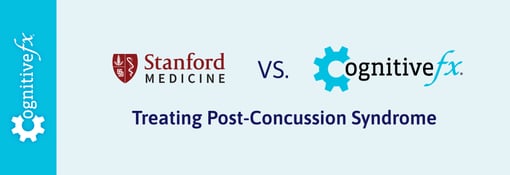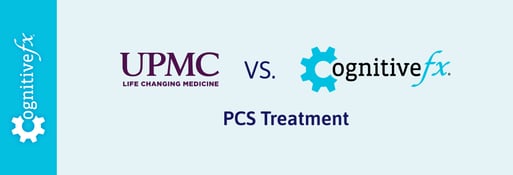From a small outpatient clinic in the 1920s, Cleveland Clinic has grown to become one of the world’s largest integrated medical systems. With over 65,000 providers worldwide, Cleveland Clinic has almost 6 million patient visits per year, at more than 200 locations.
When it comes to concussions, Cleveland Clinic specializes in treating sports-related concussions in their Concussion Center. Their team members have many years of experience dealing with athletes at all levels — recreational, high school, collegiate, and professional — to ensure a safe return to sport. They care for athletes at more than 50 high schools and four colleges in Northeast Ohio.
If you or a loved one are an athlete who has suffered a recent concussion, it may be worth seeking treatment through Cleveland Clinic. However, if you're experiencing persistent symptoms after your concussion lasting several months or more — a condition known as post-concussion syndrome (PCS) — Cleveland Clinic will likely not be the best option for you.
As we'll explain below, treating post-concussion syndrome requires different resources and a different approach compared to treating recent concussions (known as acute concussions).
At Cognitive FX, we specialize in post-concussion syndrome treatment. Our patients receive multidisciplinary therapy from a large staff of diverse specialists, all of whom are trained in brain injury rehabilitation. We also offer functional brain imaging that identifies which specific areas of your brain were affected by the injury and in what way. This allows us to tailor your treatment plan to your brain, something most clinics simply cannot do.
In this article, we'll compare concussion treatment at Cleveland Clinic and Cognitive FX to help you understand which clinic would better suit your specific needs. We'll discuss how our clinics differ in terms of:
90% of our patients report reduced symptoms after their treatment at Cognitive FX. To see if you’re a good fit for our program, sign up for a consultation.
Staff Expertise

The Medical Team at Cleveland Clinic Specializes in Assessing and Treating Acute Sports-Related Concussions
Cleveland Clinic’s Concussion Center mainly treats recently concussed patients after a sports-related injury. At the moment, they don’t have a dedicated department for treating patients with lingering post-concussion symptoms and there is no indication on their website that they can treat these patients.
They offer multidisciplinary treatments (more on this later) and have a diverse team, including:
- Sports medicine physicians
- Neurologists and other neurology specialists
- Primary care physicians
- Pediatricians
- Physiatrists
- Certified athletic trainers
- Physical therapists
- Vestibular therapists
- Neuropsychologists
- Ophthalmologists/ optometrists
- Neurosurgeons
- Radiologists
- Psychologists
- Chiropractors
- Speech therapists
- Acupuncturists
- Massotherapists
- Researchers
The Multidisciplinary Team at Cognitive FX Is Tightly Coordinated and Specializes in Treating Post-concussion Syndrome
In contrast, Cognitive FX specializes in treating PCS patients with persistent symptoms after a concussion. Symptoms may include recurrent headaches, dizziness, and cognitive problems lasting for months or years.
Our doctors and therapists specialize in treating brain injury complications and long-term symptoms. Our team includes the following specialists:
|
|
|
|
|
- Speech-language pathologists
|
- Clinical neuropsychologists
|
|
|
|
- Vision and vestibular specialists
|
|
|
|
|
|
- Licensed massage therapists
|
Our expertise is centered around treating the main causes of PCS symptoms, including:
One of the main factors causing lingering symptoms after a concussion is neurovascular coupling dysfunction.
In a healthy brain, brain cells can request oxygen and nutrients from surrounding blood vessels as they need it to complete a particular task. These resources are then delivered to the right place at the right time, in a dynamic connection called neurovascular coupling (NVC).
After a head trauma, however, some areas of the brain become out of sync with their surrounding blood vessels. They may not receive the right amount of nutrients at the right time (for example, too much, too little, too early, or too late). As a consequence, they struggle to perform their tasks. Other areas of the brain often try to compensate, which puts significant strain on the brain’s function and energy levels.
As a result, patients develop headaches, brain fog, and fatigue. Thanks to our advanced imaging capabilities (described in more detail below), our team can identify exactly what areas of the brain were affected by the concussion, which allows them to develop treatment plans specifically tailored to each patient’s brain function patterns.
Our staff can also identify symptoms caused by dysfunction of the autonomic nervous system (ANS). The ANS controls many body functions, including heart rate, blood pressure, and breathing rate. This is done through the sympathetic nervous system (SNS) and the parasympathetic nervous system (PNS). The SNS facilitates our “fight or flight” response in case of stress, while the PNS controls the “rest and digest” process to calm the body.
Under normal circumstances, SNS and PNS work together in harmony, but concussions disrupt this balance. In most patients, the SNS stays active even if it’s not needed, causing symptoms such as fatigue, headaches, high blood pressure, heart rate changes, body temperature changes, digestive issues, problems sleeping, mood changes, and more.
In addition, PCS patients can also suffer breathing problems. After a concussion, the body often “forgets” how to breathe properly. A healthy brain adjusts breathing rates based on what the body needs. Exercise, for example, triggers an increase in breathing rates because muscles need more oxygen.
Concussions often disrupt this communication between the brain and lungs. If the brain can’t react to the body’s changing needs, patients suffer from breathing disturbances, causing symptoms such as shortness of breath, dizziness, flushing, and fatigue. Rehabilitation is challenging, but our team can teach patients exercises to help retrain their breathing patterns.
Finally, we have a variety of therapists specialized in specific PCS impairments, such as vision, vestibular, and speech and language problems. These therapists are trained to use various exercises tailored to each patient to address their specific symptoms. Most of the time, our therapists combine exercises from multiple therapies to address different symptoms simultaneously. This level of coordination between therapists is essential for getting the best results for PCS patients, yet rare among concussion clinics.
Key Differences
Cleveland Clinic
- Their team includes several sports-focused medical providers, including sports and exercise physicians and athletic trainers.
- Their team’s expertise is centered around treating athletes with recently sustained concussions.
- They do not have a dedicated department for treating patients with persistent symptoms lasting months or years after their injury.
Cognitive FX
- Our team includes a wide range of medical specialties highly relevant to treating lingering symptoms of brain injury, such as neurosurgery, clinical neuropsychology, neuroscience, cognitive therapy, physical therapy, massage therapy, vestibular therapy, occupational therapy, and more.
- Our team is entirely focused on treating persistent, long-term symptoms of brain injury. Cognitive FX is where you would go when you ‘graduate’ Cleveland Clinic’s acute concussion or TBI program but your recovery is not complete and you still have limitations you’d like to overcome.
- Our team is well-versed in treating both sports-related and non-sports-related concussions.
Patient Evaluation

Cleveland Clinic Offers Standard Acute Concussion Evaluation That Is Athlete Focused (But Lacks Functional NeuroCognitive Imaging to See Exactly Where the Brain Has Been Affected)
Cleveland Clinic lists slightly different evaluation processes for athlete and non-athlete concussions.
Athlete Concussions
Athletes can attend Cleveland Clinic after a concussion. Ideally, they should have been removed from play and assessed for symptoms on the sidelines. However, it’s important to undergo a thorough medical evaluation conducted by a physician experienced in evaluating and treating concussions, before starting a progressive return to play.
Some of the evaluation tests done at Cleveland Clinic include:
ImPACT (Immediate Post-Concussion Assessment and Cognitive Testing)
This is a widely used concussion assessment computerized program used after sports-related concussions. Typically, it takes about 20-30 minutes to complete and assesses different cognitive functions, including verbal and visual memory, processing speed, and reaction time. Once completed, it can help medical experts to decide what to do next.
Cleveland Clinics also works closely with many sports teams, providing baseline testing before the season starts. Cleveland Clinic Sports Health experts administer ImPACT testing to get baseline data for every athlete, measuring their memory, reaction time, and other cognitive functions before any concussion. If athletes suffer a concussion during the season, a medical expert from the Cleveland Clinic re-evaluates them and administers another ImPACT test within 24 to 72 hours of the concussion. By comparing the results from both ImPACT tests, doctors can determine the severity of concussion.
If the athlete presents symptoms, they can meet with a Cleveland Clinic Sports Health physician for a management plan focused on returning to play safely. Athletes are closely monitored during their recovery and when they experience 24-48 hours without symptoms, they can progressively return to play under supervision safely. ImPACT testing can be administered again to determine when an athlete can safely return to play.
Neurocognitive Assessment
Neuropsychologists or speech therapists can evaluate memory, concentration, and language to detect any cognitive problems that can occur after a head trauma. The results from this assessment will be used to develop a tailored cognitive rehabilitation program to help patients recover.
Physical Assessment
In addition to the ImPACT test, patients complete a thorough physical assessment. Some of the tests include:
- Drop Test: Test to measure reaction time. It takes about 5 minutes to complete.
- Balance Testing: Test to measure how the patient can balance in various foot positions, on both a hard and foam surface. This test is called the BESS (Balance Error Scoring System) test.
Brain Imaging
The Concussion Center also has links to the Imaging Institute, where patients can be assessed using MRI if needed. They’ve developed specific protocols such as image sequencing to examine patients who have sustained a concussion. The goal is to identify subtle indicators of the injury that standard brain imaging scans, like MRI or CT scans, cannot detect.
Cleveland Clinic Concussion (C3) App
Cleveland Clinic developed a mobile phone application called the Cleveland Clinic Concussion (C3) that can assess cognitive and physical function both before (baseline testing) and after the injury. For patients with baseline data, the C3 app can measure symptoms after a concussion and help determine when recovery is complete. The C3 app compares balance, reaction time, memory, and vision before and after a concussion. The app also highlights areas of most concern and helps guide therapy over time.
Non-athlete Concussions
For patients who suffered a non-sports concussion, evaluation is similar with the exception that these patients don’t have ImPACT baseline results. It consists of:
- Physical assessment: This is done in the same way as for athletes, including a drop test and the BESS test.
- C3 application: Cleveland Clinic’s medical team uses this app to collect relevant information for each patient. This information will be used to help with the recovery process.
Cognitive FX Offers Extensive Evaluation for Post-concussion Syndrome (Including Functional NeuroCognitive Imaging That Shows Where a Patient’s Brain Has Been Affected)
At Cognitive FX, all our patients receive the same comprehensive evaluation, independently of where it happened. Patients undergo a variety of exams, including:
- A review of the patient’s medical history and symptoms present.
- A physical exam to assess balance, hand-eye coordination, functional vision, reaction times, and other physical abilities. For example, patients have to perform a series of tests using digital eye-tracking software to help our therapists identify vision deficits, such as difficulty tracking or poor peripheral vision.
- A cognitive assessment to evaluate memory, focus, thinking, and other skills.
- A psychological evaluation to spot symptoms of mental health problems, such as anxiety and depression.
- A structural brain and cervical spine MRI to identify serious structural injuries that need medical treatment.

One of the timed exercises included in patient evaluations at Cognitive FX.
During the initial evaluation, our team also looks for signs of ANS dysfunction, and a neurointegration specialist evaluates how well the patient’s inner ear, eyes, and body communicate with each other. We repeat the same tests at the end of the treatment week to assess how much the patient has improved.
Patients also complete a specialized brain scan called functional Neurocognitive Imaging (fNCI). This scan assesses blood flow in 100 different regions in the brain while patients complete a set of predetermined cognitive tasks. The resultant near-real-time images are then combined and compared to a healthy control database to identify the areas where NVC dysfunction is disrupting normal functioning. Key regions of the brain each receive a score that reflects their performance. Scores in the yellow to red sections indicate neurovascular coupling dysfunction in the areas of the brain responsible for that particular cognitive function.
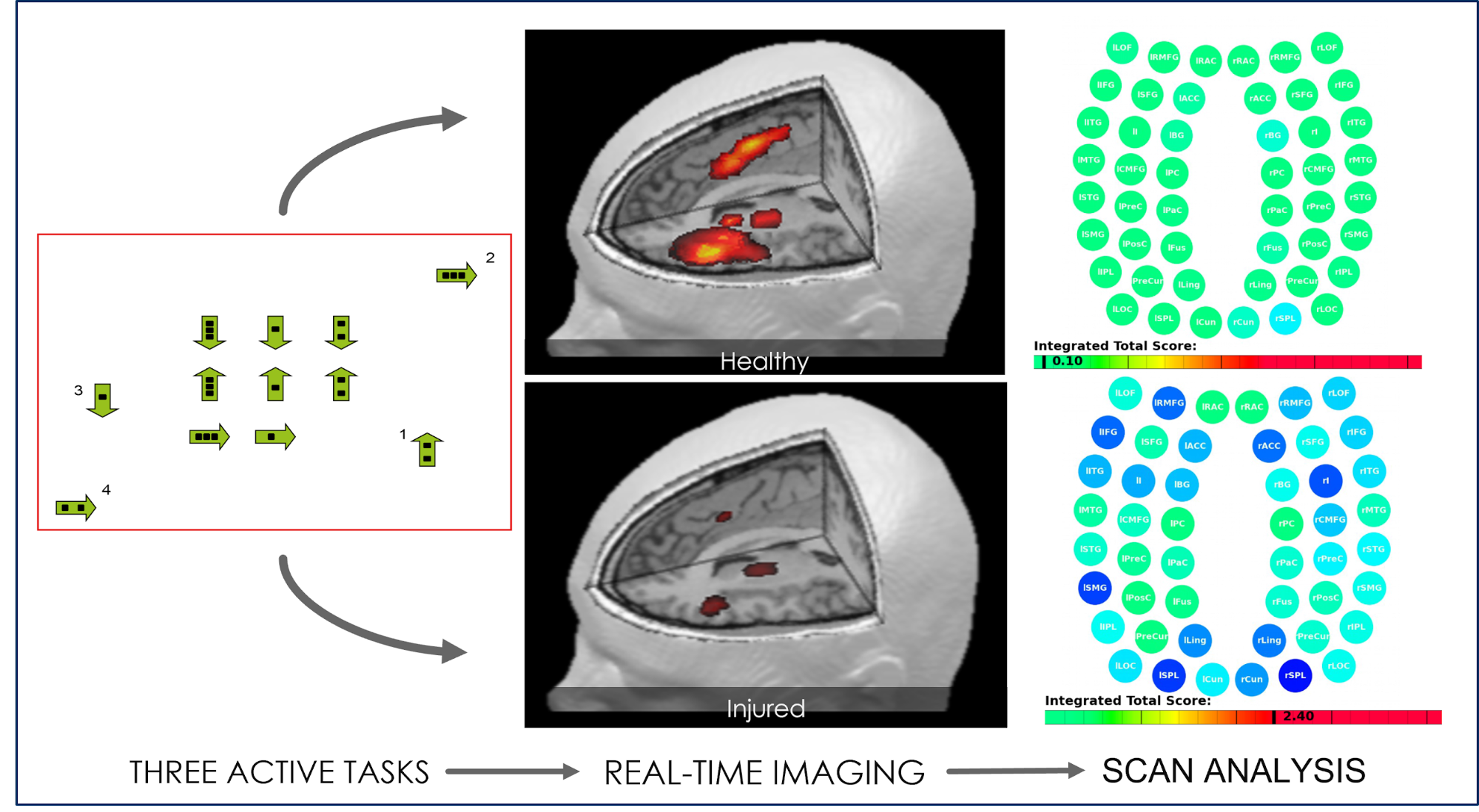
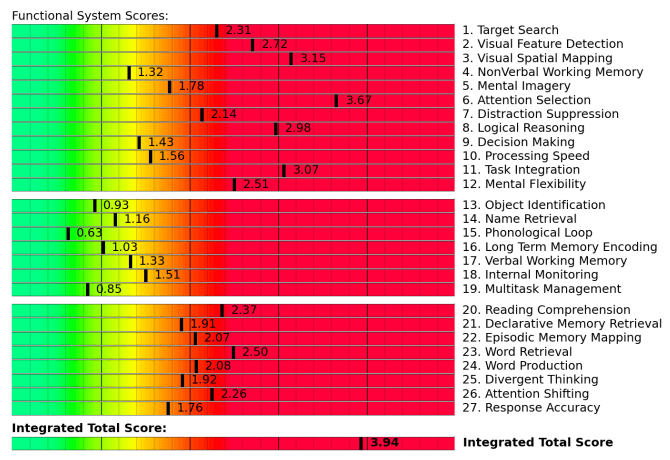
The scan also measures how different brain regions communicate with each other. In this case, regions in green are normal, whereas areas in blue are less active than expected. For example, in the image below, rACC (the right anterior cingulate cortex) shows less activity than usual. This area is crucial for attention and could contribute to memory problems if not functioning normally.
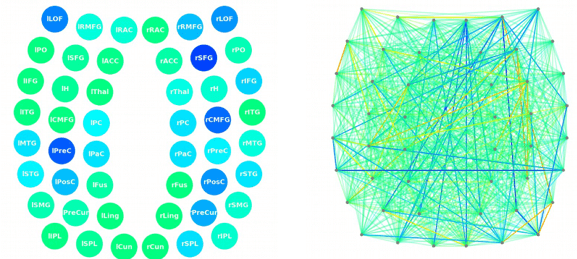
This scan is a key part of our patient evaluation and is something Cleveland Clinic does not offer.
Patient story: How a former figure skater learned years of chronic illness was due to post-concussion syndrome
Once all assessments are complete, our team can design a personalized treatment plan to target exactly the areas of the brain that showed dysfunction.
Key Differences
Cleveland Clinic
- Patient evaluation is heavily geared towards assessing recently sustained, sports-related concussions.
- Patient evaluation mainly focuses on assessing physical symptoms, with less consideration towards cognitive and emotional issues.
- Functional neurocognitive imaging is not offered, and therefore cannot be used to inform and tailor treatment to each individual.
Cognitive FX
- Cognitive FX offers a more extensive patient assessment that considers medical history, the patient’s list of symptoms, and the results of physical, cognitive, and emotional evaluations. Our assessment goes deeper into assessing issues such as autonomic, vestibular, and vision dysfunction.
- All patients undergo an fNCI brain scan which reveals blood flow patterns (an approximation for brain function) in 100 brain regions. This brain imaging allows us to identify which areas of the brain were affected by the concussion. The results are used to provide a tailored treatment for each patient.
Treatments Offered

Cleveland Clinic Offers Treatments Such As Physical Therapy and Pain Management (But Lacks Dedicated Treatment for Post-concussion Syndrome)
The team at Cleveland Clinic offers individualized treatment plans for each patient, taking into account the patient’s age, level of activity, concussion history, and any factors that may delay their recovery. They offer limited information regarding their treatment options, but their advice seems in line with modern best practices. Specifically, Cleveland Clinic follows an active rehabilitation method, where patients are encouraged to exercise regularly and return to normal activities gradually.
Some of their treatment options include:
- Physical therapy: Therapists at Cleveland Clinic use a variety of exercises to rehabilitate head and neck discomfort, balance, function, and pain management.
- Pain management: Cleveland Clinic also offers various treatments to deal with constant pain (such as neck and head pain after whiplash) through their Pediatric Chronic Pain Program for children and the Center for Neurological Restoration for adults. Psychologists employ a variety of techniques, including cognitive behavioral therapy (CBT), relaxation therapy, and biofeedback, while a specialized team of therapists addresses vision and vestibular issues.
- Sleep evaluations: For patients who are having problems sleeping after their head injury, Cleveland Clinic offers customized sleep evaluations and treatment. These tests can be conducted at one of their seven sleep laboratories, or in the patient’s home. Once patients are diagnosed, a team of sleep psychologists, psychiatrists, and otolaryngologists (ear, nose, and throat specialists) can develop a treatment plan for each patient.
- Return to play: Concussed athletes need to follow a specific protocol before they can return to full training and playing. The team at Cleveland Clinic can help patients return to play in the safest manner possible. Patients start with light aerobic exercise and then gradually move on to more intense and complex exercises until they return to full practice. Patients are not allowed to increase their level of activity without consent from a doctor from Cleveland’s team. If the athlete experiences symptoms, they must return to the previous level.
Cognitive FX Offers Multidisciplinary Treatment for Post-concussion Syndrome (Tailored Based on Each Individual’s fNCI Scan)
Once patients complete their evaluation, they are ready to start treatment. Each patient receives a completely customized treatment plan. Our therapists use a combination of aerobic exercise and multidisciplinary therapies to target the root causes of PCS symptoms in patients, including neurovascular coupling disruption, autonomic dysfunction, vision changes, and vestibular issues.
Typically, treatment involves a three-step cycle that is repeated throughout treatment: Prepare, Activate, and Recover.

Prepare
Treatment starts with short sessions of aerobic exercise, typically on a stationary bike or treadmill. The aim is to promote blood flow within the brain and trigger the release of many helpful neurochemicals, including the compound brain-derived neurotrophic factor (BDNF). BDNF helps the brain learn new information boosting the efficacy of subsequent therapies.
.jpg?width=1999&height=1500&name=TIA%20(6).jpg)
Activate
During the activate step, patients attend a variety of therapies. While patients receive most of the therapies we offer, the exact combination of exercises within each therapy varies considerably depending on the results of the brain scan. This level of personalized treatment is something that Cleveland Clinic does not offer.
|
Therapies Offered at Cognitive FX
At Cognitive FX, the primary purpose of each therapy is to stimulate healthier NVC in the brain regions identified as underperforming for each patient. Different therapies excel at helping different brain regions. All therapies are conducted in-house with close, daily communication between therapists to ensure they are fine-tuned for your needs.
|
|
Cognitive therapy
|
- The aim is to engage key brain regions and rehabilitate cognitive skills, such as memory, attention, decision-making, information processing and reasoning.
- Patients engage in cognitive activities, such as solving logic puzzles and identifying word patterns.
|
|
Occupational therapy
|
- Patients engage in exercises that help the brain, body, and eyes coordinate with each other.
- Therapists help patients readjust to their daily activities by focusing on difficulties identified on their fNCI scan, including compensatory strategies for work and school as they recover.
|
|
Neuromuscular therapy
|
- The aim is to relieve headaches and neck pain, rehabilitate balance, improve body-brain coordination, and promote physical activity.
- Patients receive massages, stretches, and soft tissue manipulation to increase blood flow.
- Patients also engage in cognitive games and physical therapy exercises.
|
|
Sensorimotor therapy
|
- The aim is to improve cognitive and physical skills and reduce symptoms of depression.
- Patients follow simple movement patterns in time with a metronome to address cognitive, visual, and vestibular symptoms.
|
|
Vision therapy
|
- The aim is to address vision problems, such as blurred vision, difficulty focusing, and light sensitivity.
- Patients engage in different exercises, including Dynavision, visual tracking exercises, the Brock String, and some other computerized technologies.
- If patients need further therapy after treatment, our therapists can help find a suitable neuro-optometric rehabilitation program.
|
|
Neurointegration therapy (vestibular therapy)
|
- The aim is to help with a variety of vestibular issues, including poor posture, dizziness, and vertigo. Vision exercises are often incorporated as well.
- Patients engage in gaze stabilization and balance exercises. For example, patients catch a ball while standing on a balance board or walk in a figure eight pattern while keeping their eyes focused on a point.
|
|
Psychotherapy
|
- Patients meet with a clinical psychologist to evaluate their mental health status.
- For patients suffering from depression and anxiety, our therapists recommend cognitive behavioral therapy (CBT). We do not offer this type of therapy but can refer them to a specialist.
- Patients learn mindfulness exercises and other relaxation strategies.
|
Note: While care for pediatric post-concussion syndrome patients is similar to that for adults, we tailor our approach based on age.
For further information, see our post on post-concussion syndrome in children.
 Patient Scotty Allen (from the Strange Parts YouTube channel) tries Dynavision therapy.
Patient Scotty Allen (from the Strange Parts YouTube channel) tries Dynavision therapy.
Rest
The third step involves periods of rest in between therapy sessions. Patients learn a variety of breathing and mindfulness exercises, listen to brainwaves, or receive a neuromuscular massage of the neck and shoulders.
At the end of treatment, patients complete a second fNCI scan to see how their brain is responding to therapy. Finally, patients meet with one of our therapists to discuss their progress and how to continue recovery at home.
Patients receive a series of exercises to do at home, typically including aerobic exercises, cognitive games, and relaxation techniques. Ideally, we recommend engaging in these exercises about one hour every day, five days a week. When patients start to feel better, they can gradually do these exercises less often. If needed, we also provide referrals to additional specialists, such as endocrinologists, psychologists, and vision therapists.
With this approach, over 90 percent of Cognitive FX patients experience improvements in symptoms by the end of their first week of treatment, and the average symptom improvement is over 60 percent.
Key Differences
Cleveland Clinic
- Cleveland Clinic offers a variety of options for treating acute concussions, but the majority of their emphasis seems to be on physical therapy and pain management.
- Cleveland Clinic doesn’t have an organized treatment program for post-concussion syndrome.
- It’s possible to see different doctors and therapists, but there is no guaranteed coordination between healthcare professionals.
Cognitive FX
- We offer a combination of aerobic exercise and multidisciplinary therapies backed by years of research (both independent research and in-house research). Therapies offered include cognitive therapy, vision and vestibular (neurointegration) therapy, sensorimotor therapy, neuromuscular and physical therapy, occupational therapy, psychotherapy, and more.
- Therapies are tailored for each patient to address the underlying issues causing PCS symptoms (based on results from the fNCI brain scan).
- Patients engage in exercises that target more than one symptom at the same time to maximize recovery. For example, patients may be asked to balance on a Bosu ball (vestibular therapy) and recite the names of animals alphabetically (cognitive therapy) while catching a ball (vision/physical therapy).
- Our team is in constant communication regarding our patients’ progress and how to adjust the difficulty levels and type of therapy they receive.
- We also offer patient support after treatment, including exercises to continue recovery at home.
Pricing and Insurance

Cleveland Clinic Provides a Cost Estimator and Accepts a Variety of Insurance Plans
Patients at Cleveland Clinic can estimate the cost of their treatment using their cost estimator. This includes an estimate of any out-of-pocket costs for tests and procedures that are not covered by your insurance. It’s important to note that this is not a guarantee and the final bill may be different.
Cleveland Clinic accepts a variety of plans from different insurance companies. Plans accepted can be reviewed here. Some patients may also be able to claim financial assistance to help with treatment costs.
Cognitive FX Offers Four Transparent Pricing Packages and Can Provide Codes to Obtain Partial Reimbursement From Insurance Companies
Cognitive FX is not an in-network provider with any insurance providers, but we can provide CPT codes (see the full list on our pricing page), and some of our patients may obtain partial reimbursement from their insurance companies.
Our treatment is costly but priced fairly for the services we offer. No other clinic in the world — including Cleveland Clinic — has assembled a medical team as extensive as ours nor do they offer the same level of personalized treatment, thanks to the fNCI results.
We offer four packages for patients to choose from, ranging from $2,500 to $24,700. If patients choose one of the packages with just the brain scan — “fNCI only” or the “fNCI + Action plan” — but then decide to continue treatment with us, the initial cost is credited to the cost of treatment. For example, if you choose the fNCI scan only but then decide to attend one week of treatment, your treatment plan cost would be $10,500 ($13,000 less the $2,500 you already paid for the scan).
If you need help choosing the right treatment plan, a member of our team would be happy to discuss options with you.
.jpg?width=1472&height=1999&name=Comparing%20Treatment%20Plans%20at%20Cognitive%20FX%20(2024).jpg)
Overall Conclusions
Cleveland Clinic primarily focuses on treating acute sports-related concussions. Their Concussion Center is well-equipped to handle immediate assessments and concussion management, ensuring athletes can return to their sports safely and effectively. However, it lacks a dedicated department for treating persistent post-concussion symptoms, making it less suitable for individuals suffering from long-term effects of brain injuries.
On the other hand, Cognitive FX specializes in treating post-concussion syndrome and long term effects from traumatic brain injury, offering a multidisciplinary approach tailored to each patient's unique brain function. We use advanced brain imaging to pinpoint affected brain areas, enabling highly personalized treatment plans. Our comprehensive evaluation and treatment for PCS include addressing neurovascular coupling dysfunction, autonomic nervous system issues, and other chronic symptoms. Our team includes a range of specialists, all of whom focus specifically on long-term brain injury rehabilitation.
In conclusion, while Cleveland Clinic provides solid post-injury concussion care and neurorehabilitation for acute injuries, particularly in athletes, Cognitive FX offers superior resources and expertise for those dealing with prolonged symptoms of post-concussion syndrome. The clear distinction in focus and patient care strategies between the two institutions underscores the importance of choosing a treatment center that aligns with the patient’s specific health needs and the nature of their concussion.
The average symptom improvement reported by our patients is 60 percent. To see if you’re a good fit for our program, sign up for a consultation


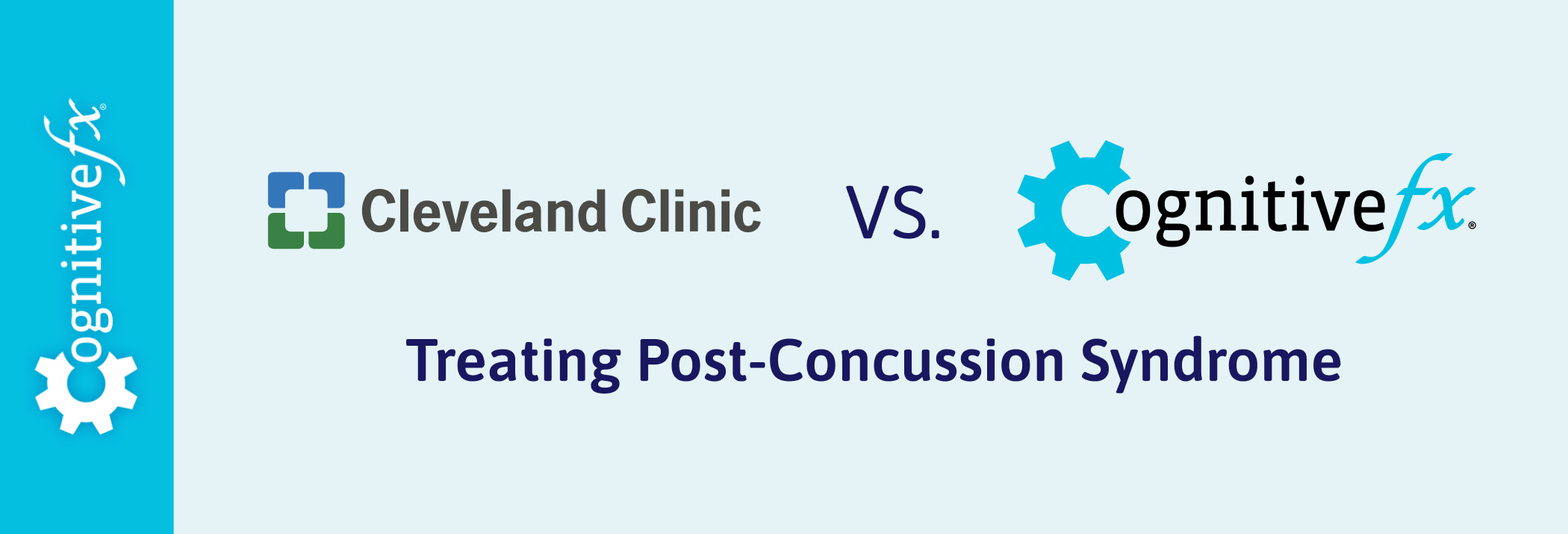








.jpg?width=1999&height=1500&name=TIA%20(6).jpg)


.jpg?width=1472&height=1999&name=Comparing%20Treatment%20Plans%20at%20Cognitive%20FX%20(2024).jpg)

